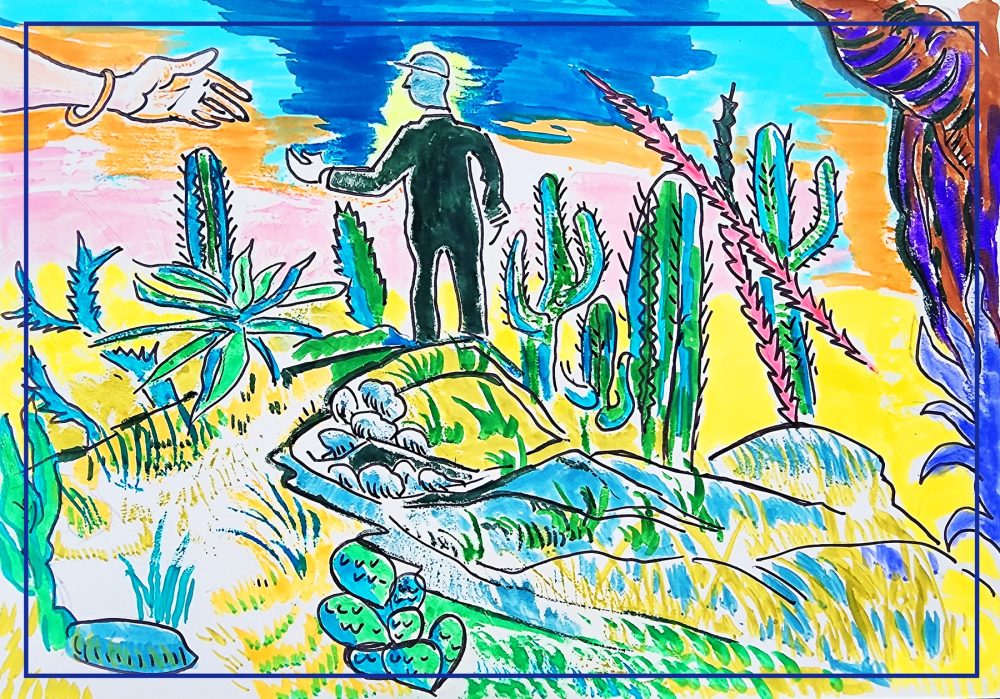
Champak Ram was not at all an average student. Tall, quiet, and introverted, he walked through the bustling corridors of the IIIT-B campus with his head down, lost in his thoughts. From the very first day at institute, Champak preferred solitude. He kept to himself, avoided group activities, and always studied alone in the corner of the library. To his classmates, he was a mystery—someone who was there, yet always seemed far away. His friends called him Akela Champu.
While his peers bonded over late-night study sessions, campus festivals, and impromptu chai breaks, Champak found solace in his books. He believed he didn’t need anyone else—after all, hadn’t he always been self-sufficient? He thought institute was just about academics, and as long as his grades were good, everything else was irrelevant.
But slowly, cracks began to show.
One evening, Champak found himself stuck on a complex challenging AI problem – implementation of neural networks. Hours passed, and frustration grew. He glanced around the library, seeing groups of students working together, sharing notes, and laughing over the very concepts he was struggling with. A few times, someone invited him to join their study group, but Champak politely declined, convinced he could figure it out on his own.
Days turned into weeks, and the weight of isolation started to take its toll. Champak’s grades began slipping—not because he wasn’t smart, but because he lacked the support system that others had. His classmates collaborated, exchanged ideas, and kept each other motivated, while Champak battled everything alone. His stress levels soared. Simple questions now felt overwhelming, and sleepless nights became routine.
Socially, things were even worse. While others enjoyed campus life, Champak became invisible. No one to talk to, no one to share his fears or frustrations. The loneliness crept in like an unwelcome guest. Anxiety replaced his calm demeanour. The solitude he once cherished felt more like a burden.
Then came the day that changed everything.
A sudden family emergency called Champak back home. His isolation meant no one knew him well enough to check in on him or offer support. As the pressure mounted from all sides—personal struggles, academic failures, and emotional exhaustion—Champak made a tough decision. He couldn’t continue like this.
One afternoon, Champak stood in front of the Dean’s office, holding his withdrawal form. Tears welled in his eyes as he recalled the dreams he had when he first stepped foot on campus. But the dreams had faded, swallowed by loneliness. He knew he had to leave. Champk went around completing his exit formalities.
Before leaving campus, Champak bumped into a classmate who had always tried to include him in group activities.
“Hey, Champak, where’ve you been? Haven’t seen you in a while,” she said, genuinely concerned.
“I’m… leaving,” he replied softly.
Surprised, she asked why. Champak sighed, “I thought I could do it all on my own… but I was wrong.”
As Champak walked away, he realized too late what he had missed. The support he had needed was always there—just an outstretched hand away. But he never reached out, and now, he was leaving with a heavy heart and a lesson learned too late.
As Champak turned to leave the campus, his classmate—the one who always tried to include him in group activities— again stopped him with an unexpected question.
“Wait, Champak… before you go, can I tell you something? Something I’ve never told anyone?”
Champak paused, unsure whether to stay or continue walking away. He glanced at her, and for the first time, there was something in her eyes that piqued his curiosity. She continued before he could respond.
“I was just like you… in fact, I used to be you.”
Champak furrowed his brow, confused. “What do you mean?”
She sighed, her voice dropping to a whisper. “Before you came here, I was the ‘Akeli Champa,’ the one everyone teased for being a loner. I thought I didn’t need anyone either, that I could handle everything on my own. I kept my head down, buried myself in books, and ignored everyone. Then something happened that changed everything.”
Champak’s eyes widened as he listened.
“It wasn’t until I nearly failed a critical exam, too caught up in my own world to realize I needed help, that I broke down. A group of classmates—people I had ignored for months—offered to help me study. Not because they felt sorry for me, but because they genuinely cared. That moment, I realized I didn’t have to carry everything on my own. All I had to do was let them in.”
She smiled softly, looking Champak in the eye. “And now, look at me. I’m still that quiet, introverted person inside, but I’m no longer alone. I found balance. You can too, Champak. Don’t throw away your future over a mistake I know you’re smart enough to fix.”
Champak’s mind raced. He hadn’t expected this twist. He’d thought of her as one of the popular students, always surrounded by friends. But her words resonated deep within him. For the first time, he saw a version of himself in her—a version that had found a way through the loneliness.
Then she said something that caught him completely off guard.
“And besides, you leaving won’t work.”
Champak blinked. “What do you mean?”
She chuckled. “Didn’t you hear? I just saw the Dean. They’ve put your withdrawal on hold.”
Champak stared at her, stunned. “What? Why?”
She shrugged playfully. “Because I told them you need a second chance. And trust me, you’re going to stick around for that challenging AI problem – the implementation of neural networks study group tomorrow. We’ll figure it out together, Akela Champu.”
For the first time in a long while, Champak didn’t feel alone. He smiled—a small, tentative smile, but a smile nonetheless. Maybe, just maybe, things could be different.
The journey wasn’t over after all.
Moral of the Story – Everyone has moments of loneliness and self-doubt, but no one has to face them alone. Champak’s story reminds us that even the most independent souls need connection and support. Institute or a college is not just about academic achievements; it’s about learning to trust others, build friendships, and share the journey. Sometimes, all it takes is one hand reaching out to change everything. Don’t be afraid to accept help, and remember: second chances often come when you least expect them—if you’re open to them. Also fellow students should look out for such loners so that no student is left behind in the journey of learning and life in general.
Written by: Cmde S R Sridhar (Retd.), Registrar, IIIT-Banglore
Sketch by: Mr. Kannan V, IIIT-Bangalore


